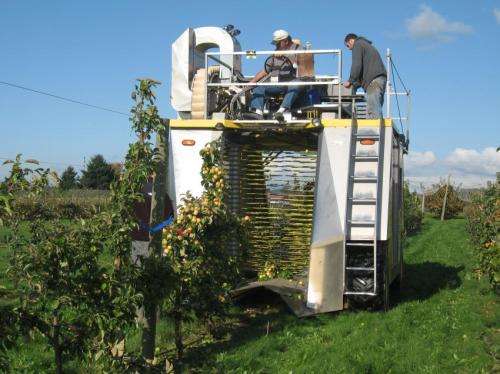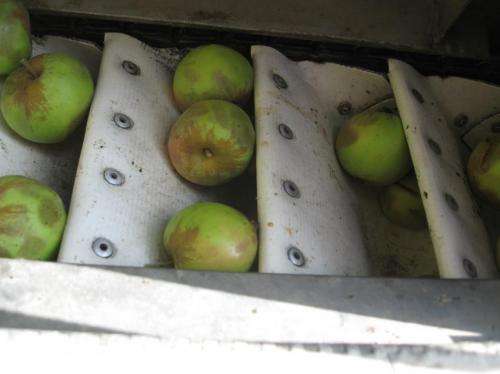Research reveals promising technology to expand hard cider industry

A new study by researchers at Washington State University shows that mechanical harvesting of cider apples can provide labor and cost savings without affecting fruit, juice, or cider quality.
The study, published in the journal HortTechnology in October, is one of several studies focused on cider apple production in Washington State. It was conducted in response to growing demand for hard cider apples in the state and the nation.
Quenching a thirst for cider
Hard cider consumption is trending steeply upward in the region surrounding the food-conscious Seattle, and Washington is leading the nation's hard cider revival. The amount of cider produced in the state tripled between 2007 and 2012.
The rapid expansion of the industry means cider apple growers are hard pressed to keep pace with demand. Because cider apples are smaller than dessert apples—the kind we find in the grocery store for fresh eating—it takes longer to harvest them. In fact, harvest labor can account for nearly half of the annual costs of an orchard in full production.
Regions like the Skagit Valley in Western Washington that don't have large-scale commercial apple production lack experienced apple harvest crews.
"We simply don't have a dedicated agricultural labor market in Western Washington," said horticulturalist Carol Miles, the lead author of the study. "High quality and affordable labor to hand-harvest cider apples is difficult to come by and costly."
Miles leads one of only a handful cider apple research programs in the nation, located at the WSU Northwestern Washington Research and Extension Center.

Over-the-row harvesting
Mechanical harvest is a logical solution to this challenge but for two things. First, such a machine currently doesn't exist for apples, which are now generally grown in compact trellis systems and hand-picked and carefully handled to avoid any bruising.
The other issue is that mechanical harvest is likely to damage the fruit but just what this means for the final product is unknown.
To address the first challenge, Miles and her team used a mechanical raspberry harvesting machine to harvest a variety of cider apple called Brown Snout grown at the research center. The machine passes over fruit trees that are no higher than six feet, knocking the apples from trees and carrying them onto a conveyer belt for collection by workers in to tote bins.
Researchers assessed the level of damage to the trees and tested the fruit to see what impact bruising had, if any, on fruit and juice quality.
Olive harvester might be suitable
The two-year study showed that machine harvesting required up to four times less labor than hand harvesting, resulting in an average cost savings of $324 per acre. Bruising did occur on all of the fruit, but it didn't effect on the quality of fruit or juice whether the apples were processed immediately or cold-stored for two to four weeks before pressing.
Miles noted that modifications to the small fruit mechanical harvester could further improve efficiencies for apple harvest. She dreams of one day testing an olive harvester which can pass over trees that are ten to twelve feet tall - the common height for modern apple orchards.
If suitable equipment is available and affordable, then mechanical harvesting could be just what the industry needs to expand and keep up with demand for locally grown cider apples.
More information: Yield, Labor, and Fruit and Juice Quality Characteristics of Machine and Hand-harvested 'Brown Snout' Specialty Cider Apple. Carol A. Miles and Jaqueline King. HortTechnology October 2014 24:519-526
Journal information: HortTechnology
Provided by Washington State University

















